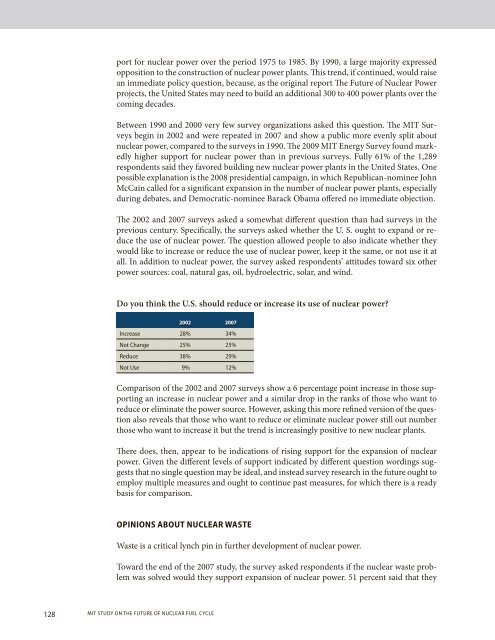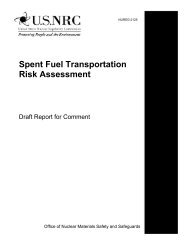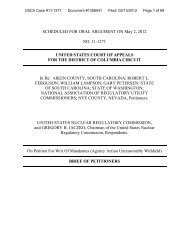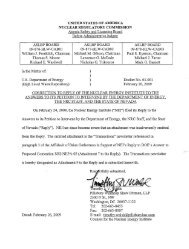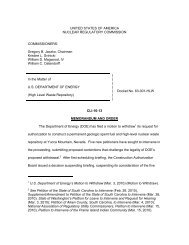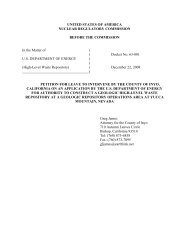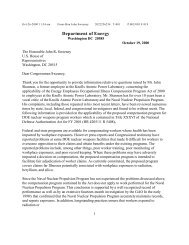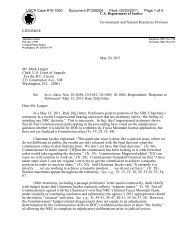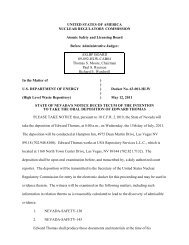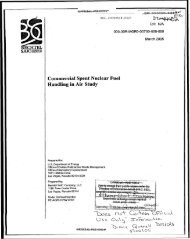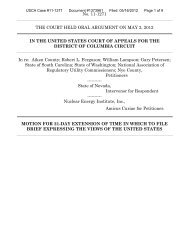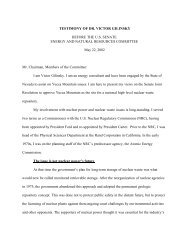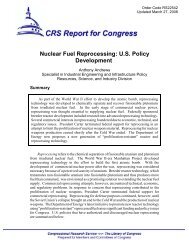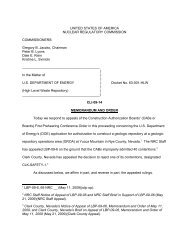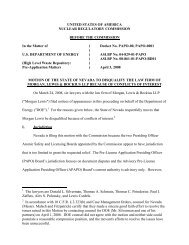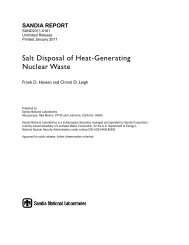The FuTure oF nuclear Fuel cycle - MIT Energy Initiative
The FuTure oF nuclear Fuel cycle - MIT Energy Initiative
The FuTure oF nuclear Fuel cycle - MIT Energy Initiative
Create successful ePaper yourself
Turn your PDF publications into a flip-book with our unique Google optimized e-Paper software.
port for <strong>nuclear</strong> power over the period 1975 to 1985. By 1990, a large majority expressed<br />
opposition to the construction of <strong>nuclear</strong> power plants. This trend, if continued, would raise<br />
an immediate policy question, because, as the original report <strong>The</strong> Future of Nuclear Power<br />
projects, the United States may need to build an additional 300 to 400 power plants over the<br />
coming decades.<br />
Between 1990 and 2000 very few survey organizations asked this question. <strong>The</strong> <strong>MIT</strong> Surveys<br />
begin in 2002 and were repeated in 2007 and show a public more evenly split about<br />
<strong>nuclear</strong> power, compared to the surveys in 1990. <strong>The</strong> 2009 <strong>MIT</strong> <strong>Energy</strong> Survey found markedly<br />
higher support for <strong>nuclear</strong> power than in previous surveys. Fully 61% of the 1,289<br />
respondents said they favored building new <strong>nuclear</strong> power plants in the United States. One<br />
possible explanation is the 2008 presidential campaign, in which Republican-nominee John<br />
McCain called for a significant expansion in the number of <strong>nuclear</strong> power plants, especially<br />
during debates, and Democratic-nominee Barack Obama offered no immediate objection.<br />
<strong>The</strong> 2002 and 2007 surveys asked a somewhat different question than had surveys in the<br />
previous century. Specifically, the surveys asked whether the U. S. ought to expand or reduce<br />
the use of <strong>nuclear</strong> power. <strong>The</strong> question allowed people to also indicate whether they<br />
would like to increase or reduce the use of <strong>nuclear</strong> power, keep it the same, or not use it at<br />
all. In addition to <strong>nuclear</strong> power, the survey asked respondents’ attitudes toward six other<br />
power sources: coal, natural gas, oil, hydroelectric, solar, and wind.<br />
Do you think the U.S. should reduce or increase its use of <strong>nuclear</strong> power?<br />
2002 2007<br />
Increase 28% 34%<br />
not change 25% 25%<br />
reduce 38% 29%<br />
not use 9% 12%<br />
Comparison of the 2002 and 2007 surveys show a 6 percentage point increase in those supporting<br />
an increase in <strong>nuclear</strong> power and a similar drop in the ranks of those who want to<br />
reduce or eliminate the power source. However, asking this more refined version of the question<br />
also reveals that those who want to reduce or eliminate <strong>nuclear</strong> power still out number<br />
those who want to increase it but the trend is increasingly positive to new <strong>nuclear</strong> plants.<br />
<strong>The</strong>re does, then, appear to be indications of rising support for the expansion of <strong>nuclear</strong><br />
power. Given the different levels of support indicated by different question wordings suggests<br />
that no single question may be ideal, and instead survey research in the future ought to<br />
employ multiple measures and ought to continue past measures, for which there is a ready<br />
basis for comparison.<br />
opinionS about nuClear WaSte<br />
Waste is a critical lynch pin in further development of <strong>nuclear</strong> power.<br />
Toward the end of the 2007 study, the survey asked respondents if the <strong>nuclear</strong> waste problem<br />
was solved would they support expansion of <strong>nuclear</strong> power. 51 percent said that they<br />
128 <strong>MIT</strong> STudy on <strong>The</strong> <strong>FuTure</strong> <strong>oF</strong> <strong>nuclear</strong> <strong>Fuel</strong> <strong>cycle</strong>


